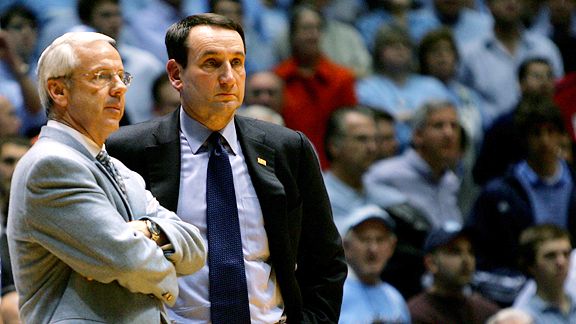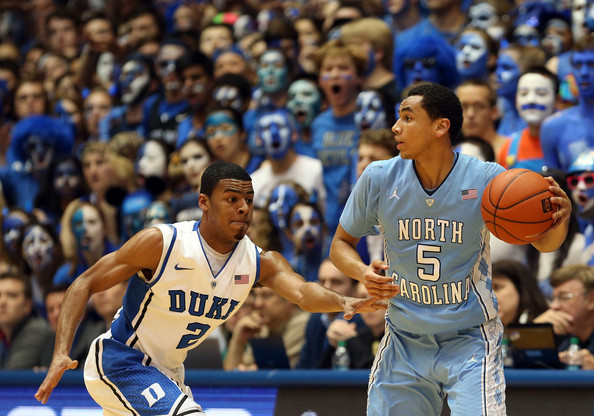Renewing The Rivalry: Previewing Duke vs. North Carolina
Posted by Brad Jenkins & Lathan Wells on February 12th, 2014After the first week and a half of ACC conference play, Duke and North Carolina were struggling with a combined 1-5 record and fans had to wonder if the ACC’s two flagship programs were headed for disaster. Just four weeks later, these are two of the hottest teams around. The Blue Devils and Tar Heels are a combined 13-2 over that stretch, with the only losses for Duke at Syracuse and at UNC at Virginia. Of course that means that we could be in for another Duke vs. North Carolina classic in Chapel Hill tonight (9:00 PM ET – ESPN). In many ways this game should resemble most of their contests – intense, fast-paced, with several swings of momentum. Also as usual, it looks like it will be a match-up of Duke’s quickness and three-point marksmanship versus North Carolina’s size and inside power. Duke will look to extend an odd trend where the Blue Devils have won the last seven times the team’s first meeting of the year is at the Smith Center, and the road team has won 11 of the last 20 regular season meetings.

Roy Williams and Coach K bring contrasting squads together tonight in renewing their rivalry (credit: gettysports)
Let’s take a closer look at some of the key questions for tonight’s game, as RTC’s Brad Jenkins and Lathan Wells go back and forth on what each team needs to do to win.
Brad Jenkins: Given North Carolina’s lack of perimeter depth and the fact that Duke is second in the country in three point shooting (42.0%), featuring six different players who have made at least 20 threes this season, how can the Tar Heels keep the Blue Devils from shooting them right out of their own gym tonight?
Lathan Wells: North Carolina’s perimeter defense has been impressive in conference play, and it really starts with J.P. Tokoto and Marcus Paige. Tokoto often draws the team’s best or most versatile perimeter threat, so it wouldn’t be surprising to see him shadowing Rodney Hood in this contest. Paige will be tasked with guarding whoever is at the point, presumably Quinn Cook. The Tar Heels have done a good job of rotating to and closing out on shooters, but foul trouble would doom their ability to combat the multitude of outside options Duke will run at them. The backcourt starters will have to play a lot of minutes to keep Duke’s long-range attempts heavily contested. While North Carolina is trying to figure out how to stymie Duke’s perimeter game, how are the Blue Devils going to slow down a reinvigorated James Michael McAdoo?
BJ: McAdoo is playing at such a high level that he poses a huge problem for any team, but expect Amile Jefferson to get the assignment initially. Jabari Parker is more bulky than Jefferson so he’ll likely guard the Tar Heel centers, Kennedy Meeks and Joel James. Jefferson is similar enough to McAdoo athletically to stay close and contest his shots, but he may not be strong enough to keep the Tar Heels’ junior star off the boards. The best thing about McAdoo right now is that he is starting games in such an attack mode that he usually draws several first half shooting fouls. Whether he converts those into points isn’t as important as the fact that he gets teams’ entire frontcourts into foul trouble. That’s another reason Duke would prefer to not have to play Parker match up against McAdoo. Since we’re discussing the frontcourt, these are two of the top three offensive rebounding teams in conference play. It’s the size and aggressiveness of North Carolina’s front line versus the quickness and athleticism of Duke’s. Who wins tonight’s crucial battle of the boards?
LW: On paper, it seems that North Carolina has a distinct advantage here. The numbers speak to it (ninth nationally in rebounding), and so does their available depth. North Carolina has both the big bodies (Kennedy Meeks, Joel James) and athletic post players (James Michael McAdoo and Brice Johnson) that will test the thinner front line of the Blue Devils. Perhaps more importantly than rebounding numbers will be how North Carolina converts offensive boards into second-chance points. In recent contests, they’ve had an abundance of squandered opportunities on second attempts, and that’ll have to change against a Duke team that will definitely put up points. Speaking of rebounding and the post, is there any way for Duke to make up for the clear disparity in frontcourt depth and talent?

The Marcus Paige-Quinn Cook matchup is just one of the battles that will decide this Carolina-Duke tilt (credit: gettyimages)
BJ: The short answer is that Duke can’t match up with the Tar Heels on the inside. Blue Devils’ opponents are hitting around 50 percent of their twos (13th in the ACC) and North Carolina gets more of its points from two-pointers (63%) than any other team in the league. The only way for Duke to combat this disparity might be to force Roy Williams to use a smaller lineup to keep up with the quicker Duke offense. That’s how Krzyzewski did it in 2001’s season-ending game in Chapel Hill, burning the Tar Heels from outside so badly that then-UNC head coach Matt Doherty took both Brendan Haywood and Kris Lang out of the game. But don’t expect Williams to make the same mistake. He knows where the Tar Heels have the edge and he will use it over and over again. Speaking of where the Tar Heels have an edge, last year a freshman Marcus Paige struggled mightily against Duke in the teams’ two meetings, scoring a total of eight points on 3-of-15 shooting. As a sophomore, Paige has elevated his game to all-ACC caliber. Can he turn the tables this year and win the point guard match-up with Duke’s Cook?
LW: This year’s Marcus Paige is a totally different player than last year’s, and Duke knows that. Last season Paige was a fallback option on offense, with his role designed to be a facilitator first and a scorer second. This year he’s become their most important and consistent scoring option. And while he’s averaging a solid 5.3 assists per game in conference play, the team needs him to look for his shot early and often. The key to Paige outplaying Cook will be putting two effective halves together. He’s shown he can turn it on in the second half after trying to get others involved in the first frame, but one productive half of scoring won’t get it done against the Blue Devils. Others have to show up for Carolina to pull the upset, but Paige absolutely has to be a major factor throughout.
So who wins?
BJ: Duke will win if the Blue Devils shoot closer to their season average from three (42%) than they do to North Carolina’s opponents’ season average (30.9%). With the Blue Devils likely to take 25-30 threes in this contest, the result could be a swing of around 12 points. Also key for the Blue Devils will be playing defense without fouling. Even if North Carolina struggles to convert their free thow opportunities, as is sometimes the case, Duke cannot afford to have their top two rebounders (Jabari Parker and Amile Jefferson) watching from the sidelines due to foul trouble.
LW: North Carolina will win if they dominate the post, leading to a heavy number of second-chance points. Duke’s depth is at play in the frontcourt, too, so foul trouble there could be a major problem for the Blue Devils. Marcus Paige and James Michael McAdoo need to put two solid offensive halves together, and the team has to play great perimeter defense in order to contest Duke’s many threes. Perhaps the single X-factor for this team and whether they emerge victorious will be what’s plagued them in losses and yet been timely in their recent wins: free throw shooting.











































